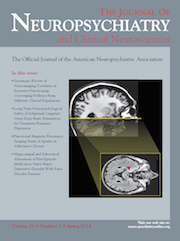Long-Term Neuropsychological Safety of Subgenual Cingulate Gyrus Deep Brain Stimulation for Treatment-Resistant Depression
Abstract
Deep brain stimulation (DBS) of the subgenual cingulate gyrus (SCG) is a promising investigational intervention for treatment-resistant depression (TRD), but long-term outcome data are limited. Serial neuropsychological evaluations, using a comprehensive battery, were conducted on four subjects with TRD prior to surgery, and up to 42 months post-operatively. Reliable change methodology suggested general stability and/or select statistically reliable improvement in cognitive abilities over time. This is the first known set of multi-year neuropsychological follow-up data for SCG DBS for TRD. Observed improvements are likely attributable to reduced depressive symptomatology, recovery of functional capacities, and/or specific practice effects of repeated assessment.



